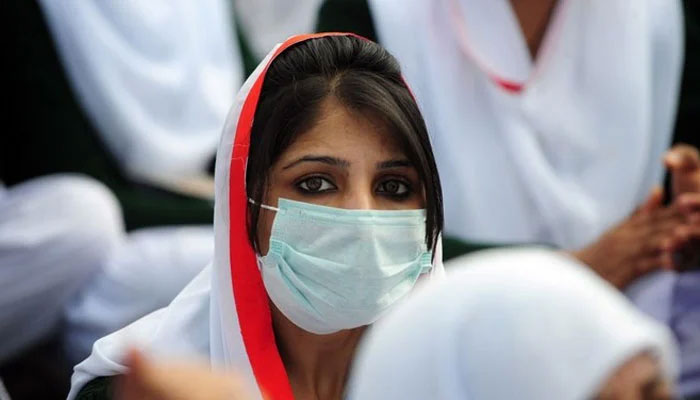Senate panel discusses nurses shortage, ghost medical colleges
Committee highlighted that 30,000 to 40,000 doctors registered with PMDC are not currently practicing
ISLAMABAD: Of the 349,418 doctors registered with Pakistan Medical and Dental Council (PMDC), around 30,000 to 40,000 don’t practice in Pakistan, while there exist ‘ghost medical colleges’ also contributing to the discrepancy between registered and practicing healthcare professionals, Senate’s Standing Committee on Health was told on Monday.
The Senate Standing Committee on National Health Services, Regulations, and Coordination, chaired by Senator Amir Waliuddin Chisti, met at the Parliament Lodges to address pressing issues in Pakistan’s healthcare sector, including the significant number of non-practicing doctors.
The committee highlighted that 30,000 to 40,000 doctors registered with the Pakistan Medical and Dental Council (PMDC) are not currently practicing. Senator Muhammad Humayun Mohmand pointed out the existence of numerous ghost colleges in Pakistan, contributing to the discrepancy between registered and practicing doctors. The committee members stressed the need for robust certification and Continuing Medical Education (CME), unanimously agreeing to update CME requirements every 10 years.
The meeting began with abriefing on the composition, functioning, and operations of the Ministry of National Health Services. The ministry officials provided an overview of key initiatives and programmes, noting that their strategy involves a multi-framework approach to achieve smooth results.
During the briefing, the Sehat Sahulat Programme, which offers free health insurance to families living below the poverty line of US$2 per day, was thoroughly discussed. The committee members noted that a significant portion of Pakistan’s population lives below the poverty line, and Senator Humayun Mohmand suggested that the ministry focus on managing this vulnerable segment of the population.
The briefing also covered polio eradication initiatives. The secretary of the Ministry of National Health Services informed the committee that, with Senator Ayesha Raza Farooq coordinating the initiative, progress is being made, and positive results are expected by next year. However, challenges such as Afghan repatriation remain, with the first health dialogue with the Afghan government set for September. On a positive note, the Afghan government has already initiated training and house campaigns. Additionally, the new policy framework and the prime minister’s initiative of the Quaid-e-Azam Health Tower, to be established in Islamabad with a focus on super specialties, research, and medical education, were extensively discussed. The secretary of NHSRC explained that this year’s funds are allocated for feasibility studies, and after detailed planning, the project will proceed. The committee members also discussed the acute shortage of nurses in Pakistan, estimated at around one million. Alongside workforce shortages, access to healthcare in rural areas was a major point of discussion. The secretary of NHSRC emphasised that additional funds are required to revamp the ministry’s operations.
The condition of hospitals, such as the Pakistan Institute of Medical Sciences (PIMS), was also highlighted. The committee members suggested refurbishing PIMS to improve healthcare access. It was noted that Rs7.4 billion project for PIMS has been approved and is expected to be completed in three years. In attendance were Senator Palwasha Mohammad Zai Khan, Senator Abdul Qudoos, Senator Syed Masroor Ahsan, Senator Liaqat Khan Tarakai, Senator Muhammad Humayun Mohmand, Senator Rahat Jamali, Senator Mohammad Abdul Qadir, the secretary of the Ministry of National Health Services, Regulations and Coordination, the president of the Pakistan Medical and Dental Council (PMDC), CEO of the Drug Regulatory Authority of Pakistan (Drap), and senior officials from the Ministry of National Health Services, Regulations and Coordination.
-
 Mexico’s President Considers Legal Action Over Elon Musk Cartel Remark
Mexico’s President Considers Legal Action Over Elon Musk Cartel Remark -
 Prince William Hits The Roof With The Andrew Saga Bleeding Into Earthshot
Prince William Hits The Roof With The Andrew Saga Bleeding Into Earthshot -
 HBO Gives Major Update About 'Industry' Season Five And Show's End
HBO Gives Major Update About 'Industry' Season Five And Show's End -
 Donnie Wahlberg Responds To 'Boston Blue' Backlash: 'Nobody Was More Disappointed Than Me'
Donnie Wahlberg Responds To 'Boston Blue' Backlash: 'Nobody Was More Disappointed Than Me' -
 Jennifer Garner Gets Emotional Over Humble Career Start: 'It Makes Me Want To Cry'
Jennifer Garner Gets Emotional Over Humble Career Start: 'It Makes Me Want To Cry' -
 Princess Beatrice Told An Acquaintance That She ‘likes’ Jeffrey Epstein: Grim Verdict Drops
Princess Beatrice Told An Acquaintance That She ‘likes’ Jeffrey Epstein: Grim Verdict Drops -
 Late Katherine Short's Neighbours Give Insights Into Her 'peace Loving' Personality Post Suicide
Late Katherine Short's Neighbours Give Insights Into Her 'peace Loving' Personality Post Suicide -
 Fresh Details Of King Charles, Queen Camilla's US Visit Emerge Amid Andrew Investigation
Fresh Details Of King Charles, Queen Camilla's US Visit Emerge Amid Andrew Investigation -
 Iran 'set To Buy' Chinese Carrier-killer Missiles As US Forces Gather In Region
Iran 'set To Buy' Chinese Carrier-killer Missiles As US Forces Gather In Region -
 Prince Harry And Meghan Unlikely To Meet Royals In Jordan
Prince Harry And Meghan Unlikely To Meet Royals In Jordan -
 Hero Fiennes Tiffin Shares Life-changing Advice He Received From Henry Cavill
Hero Fiennes Tiffin Shares Life-changing Advice He Received From Henry Cavill -
 Savannah Guthrie's Fans Receive Disappointing News
Savannah Guthrie's Fans Receive Disappointing News -
 Prince William Steps Out For First Solo Outing After Andrew's Arrest
Prince William Steps Out For First Solo Outing After Andrew's Arrest -
 Jake Paul Chooses Silence As Van Damme Once Again Challenges Him To Fight
Jake Paul Chooses Silence As Van Damme Once Again Challenges Him To Fight -
 Google Disrupts Chinese-linked Hacking Groups Behind Global Cyber Attacks
Google Disrupts Chinese-linked Hacking Groups Behind Global Cyber Attacks -
 Four People Killed In Stabbing Rampage At Washington Home
Four People Killed In Stabbing Rampage At Washington Home




